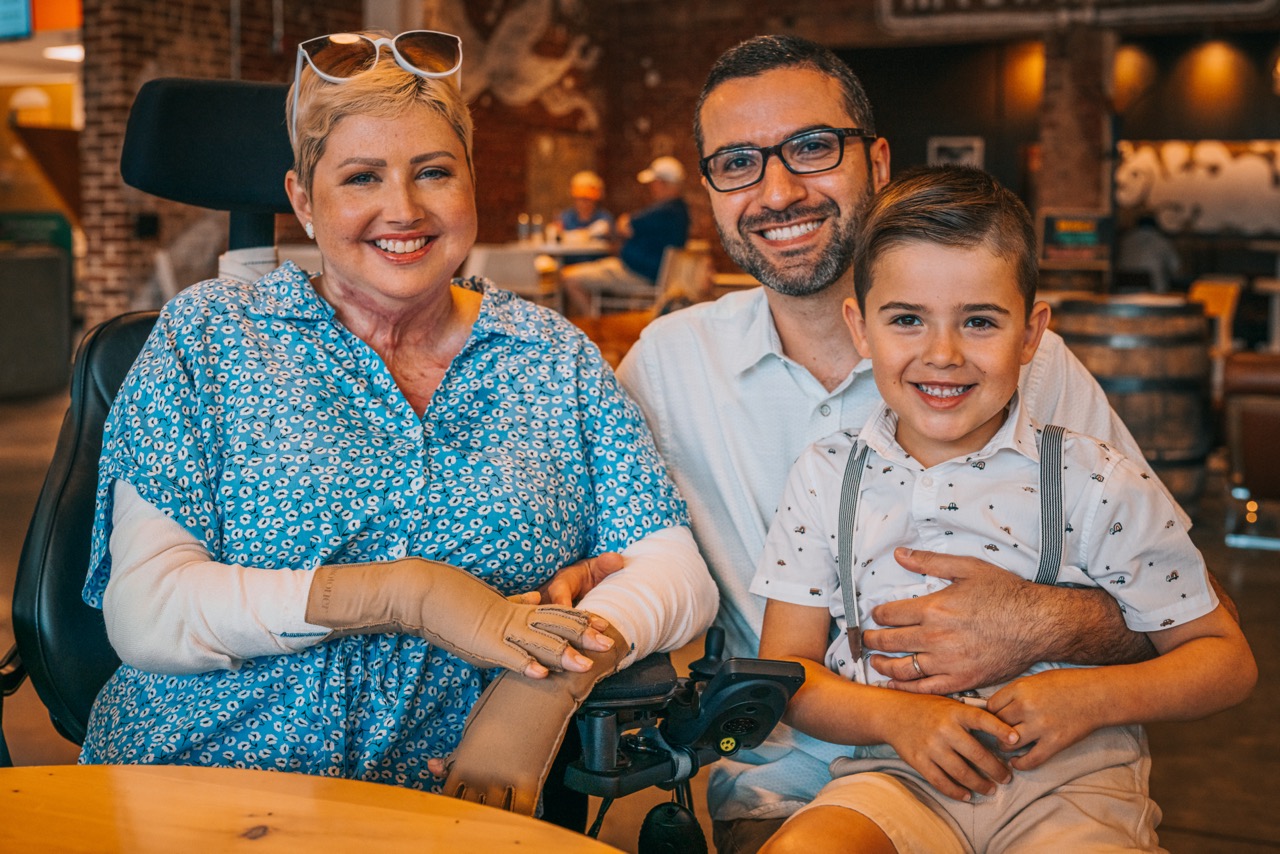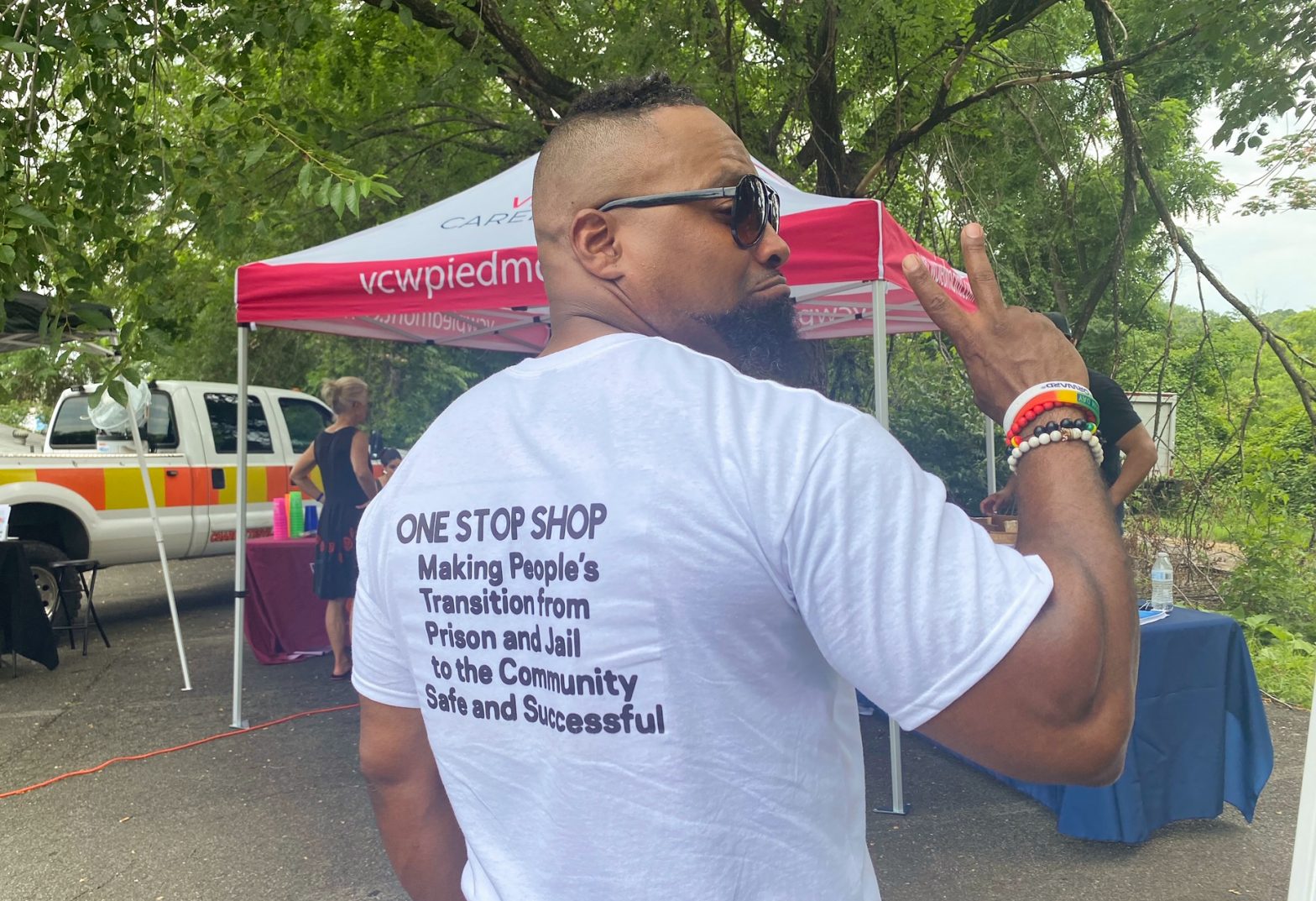The past 10 months have proven to Charlie Anne and André Xavier that life can change in an instant. It was early morning on September 10 when Charlie left the couple’s home to do some final construction work at their soon-to-open Patch Brewing Company in Gordonsville. Less than an hour later, a fiery explosion left the 35-year-old mother with third- and fourth-degree burns across 85 percent of her body—a level of injury that is almost always fatal.
“We now know that the survival rate for some fourth degree burns is less than 3 percent,” says André Xavier.
Despite those vanishingly small odds, Charlie survived thanks to a series of what the couple describes as “miracles.” Nearly a year later, with a book set to publish on the anniversary of the accident, both say their lives have been transformed. In addition to the physical and emotional anguish they’ve endured, they say the experience has deepened their connection to each other, to their faith, and to the community that has rallied around them. Through the Facebook page Cheering on Charlie and the blog by the same name, they’ve built an online audience of thousands who’ve learned about the tragedy and Charlie’s recovery.
In each post, André updates their followers on the couple’s “new and amazing life.”
“When he first started journaling, he was doing voice journaling on the car rides home,” says Charlie. “And he was doing it for me, really, you know, for me to listen to someday.”
The morning of the accident started with an argument at home. Charlie planned to spend the day working at the brewery, but André was concerned she’d been pushing herself too hard. Charlie has had rheumatoid arthritis since early childhood, and the autoimmune condition causes painful swelling of joints.
Charlie, however, was adamant. When she arrived at the brewery on Route 231, she began using an electric sander on a chalkboard for a kids’ area.
“I sort of smelled gasoline and then started slipping and I fell,” she recalls. As she fell, she dropped the sander.
“The moment it hit the concrete, it sparked an explosion,” she says. “I was totally engulfed in flames and was slipping in the flames.”
Screaming, she staggered to nearby gravel, where she dropped and rolled to extinguish the blaze.
Several other people at the brewery heard her cries and called 911. Soon after, they called André and put Charlie on the phone to tell him about the accident.
“I was like, ‘What are you talking about? I don’t have time for jokes.’ And then she texted the picture of her burns,” André says. “At that moment, I was like, ‘Oh, my gosh.’ So I knew. But at the same time, I did not know the sense of danger and how serious it was.”
The miracles the couple describes start with the Gordonsville first responders, including the swift presence of a registered nurse who happened to be minutes away when the 911 call came in. Charlie was soon airlifted to the VCU Medical Center’s burn unit in Richmond to begin what would be more than eight months of inpatient surgeries and other treatments as she battled infection, excruciating physical pain, and separation from André and the couple’s two young sons, then-4-year-old London and their infant, Julian, who was 10 months old when Charlie was burned.
Adding to the miracle of such a rapid response in a rural area, Charlie never lost consciousness, and her face wasn’t burned. In addition to being able to communicate with André, she was able to speak with medical personnel en route to and at the hospital before the commencement of a massive effort to save her life.
“No one communicated with me how bad off I was because there was no time,” Charlie says.
At the hospital, she was immediately sedated and had a procedure to treat compartment syndrome, a condition common in severe burn patients in which extreme pressure can lead to tissue necrosis. Doctors were able to save Charlie’s limbs. They also debrided her burns, removing gravel and the burned tissue from most of her body.
In the weeks and months that followed, she benefited from new medical technologies, including one, Recell, that creates aerosolized skin from a patients’ own stem cells to spray on burned areas.
The physical pain of the injuries and treatments was enormous, but the psychological impact was also devastating.
“You have the aspect of being ripped away from your family and this horrific event happening and not knowing whether or not you’re going to make it,” Charlie says. “And then just the psychological, emotional toll of just being alone. It is an opening for you to just go to a very, very dark place and to never come back.”
She says focusing on small victories helped her through.
“You’ve got to just do it day by day and [appreciate] simple things. André, when he comes next, we’re going to watch this television program,” she says. “I’m going to get to see pictures of Halloween.”
Both say their connection to God provided comfort.
“A lot of people when they go through a lot of challenging things in their life, you know, they either get closer to God or they’re torn away,” says Charlie. “And in my experience, in all the hardships that I’ve had, that’s always when I’ve gotten closer and it’s always when I’ve needed him the most.”
She says her belief that her survival was a series of miracles also sustained her.
“I mean, don’t you think I can stay strong and pull through and watch for the final miracle to happen? That final miracle of being reunited with my boys, because that was the most important thing for me, was to get back home to my boys,” Charlie says. “I just couldn’t see a world where I didn’t exist in their lives, and existing as a memory just wouldn’t have been good enough.”
That determination helped Charlie get home at the end of May—a month sooner than her doctors predicted, according to William Carter, a physician who treated Charlie at the Sheltering Arms Institute, where she was transferred to undergo rehab in the spring after leaving the hospital. She impressed the medical staff with her ability to push through pain and wean herself off medication.
“If I had to make an analogy, it’s like someone who decides to—despite the fact that there is epidurals and stuff like that available—you know, [says], ‘I’m just going to have the baby naturally,’” Carter says. “That’s kind of the approach that she was able to maintain for months.”
Marriages don’t always survive tragedy, but Charlie and André Xavier say theirs has been strengthened by the vulnerability and strength they’ve seen in each other.
“It’s definitely surpassed what we thought it could be,” says Charlie, who is currently back in the hospital for additional surgeries to close open wounds. She’ll still require years of operations, including double knee replacements.
The couple’s devotion to each other has inspired friends, including Kiri Berdan, who befriended Charlie in 2020 when both joined a local workout group for moms.
“Sitting with André, talking with him and talking with Charlie, like everything that they do is still for other people and is out of gratitude that they have Charlie here, that she’s alive,” says Berdan. “ I think that’s the most sustaining for all of us who are still trying to support and help and do what we can. It’s just knowing that they’re still, every day, trying to be better because of the accident.”
André says the book he’s writing, I Almost Lost Her: A Memoir of Unthinkable Tragedy carries a message that applies to everyone.
“To show people that no matter how drastic, how tragic, how hurtful, how difficult the situation is, there is always a choice,” he says. “You can choose to turn to God and be grateful. Or you can choose to be angry. But it is a choice.”
“My message is keep fighting. You can do it,” says Charlie, who plans to write her own book in the future. “And you know, honestly, if this message reaches somebody and it helps them, then everything was worth it. I had a purpose and I filled it, and what happened happened for a reason.”
I Almost Lost Her: A Memoir of Unthinkable Tragedy will be released September 10, and is available for preorder at cheeringoncharlie.com. Courteney Stuart is the host of “Charlottesville Right Now” on WINA. You can hear her interview with Charlie and André Xavier at wina.com.











